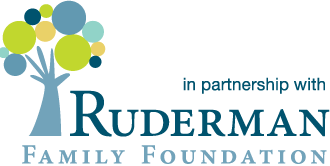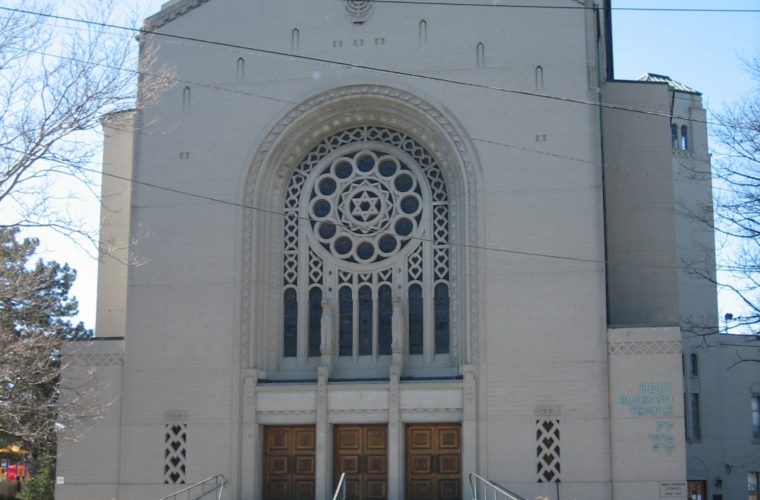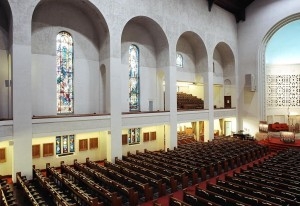Areas of Inclusion: Adults in Communal Life, Advocacy & Community Partnerships, Architectural & Physical Accommodations and Transportation, Autism, B’nai Mitzvah, General Inclusion, Mental Health, Religious School, and Worship
About the Congregation
1950 Bathurst Street
Toronto, ON M5P 3K9
Number of Congregants: 4000
Contact Information
Tema Smith
Inclusion Programming
Does this congregation have an inclusion committee?
Yes
Developing Our Program
Our programming and policies have developed organically over the years as a congregation committed to embodying an inclusive spirit. Beginning in earnest over 20 years ago when parents at Holy Blossom Temple approached the then Director of Education in order to create a program for children with learning challenges, our efforts at inclusion have spanned all departments of the synagogue, including lay leadership and Temple staff. We have recently struck an Inclusive Spirit Steering Committee, all experts in areas of inclusion in their professional lives, who will help us to continue to meet the changing needs of our congregation, whether it be in policy, programming, or facility upgrades. Inclusion is woven into the fabric of what we do here at Temple, where we strive to be a sacred community in which all congregants and those who may wish to join us feel they are known as individuals and families and that their participation and contributions of all kinds are welcomed, valued, and fulfilling.
Number of people involved in the effort: 200
Involving People with Disabilities
People with disabilities, or parents of people with disabilities, have often been the catalysts for our inclusion efforts, bringing forward their needs and concerns, and helping us to shape how we can meet them. We intend to continue to engage people with disabilities as we move forward to more inclusion initiatives.
Funding This Effort
Our efforts have different funding sources depending on the type. Our inclusion efforts in the school are funded through tuition as well as grants from UJA Federation of Greater Toronto. Our facilities accessibility efforts are funded through our capital fund, as well as through special fundraising in our latest capital campaign specifically for building accessibility. Much of our inclusion effort, though, is so woven into the fabric of what we do that it is included in our operating budget.
Helpful Agencies & Organizations
We work with congregants who either are people with disabilities, or are experts in the field of accessibility. As well, we have worked with Liviya Mendelsohn, Inclusion Director for the UJA Federation of Greater Toronto for assistance with planning and staff training.
Spreading Awareness About Our Work
We have been leveraging partnerships with community organizations to make others beyond the community aware of our initiatives, programs and policies. Within our community, we carry out targeted outreach to those who we know within our membership who may benefit from the programming we have to offer.
Process & Sharing
History, Materials & Processes that Guided Our Approach
We are currently working on updating all of these documents and will include them as they are approved. We do communicate regularly, though, about accommodations available for individual events, whether it is ASL interpreters on request, special parking, large print books, etc.
Evidence of Successful Inclusion Efforts
We have increased the number of community partnerships specifically geared at attracting people with disabilities to tailored programming, such as the No Shush Shabbat. As well, our Project Tikvah program is still going strong, and is truly a success story for Holy Blossom. These efforts at inclusion are noticed, especially as children who grew up through this program are now adults taking on key roles in the congregation, including working with our Early Childhood Centre children, and leading weekly worship services.
Evidentiary Documents
Evidence of Changing Attitudes
Our community has begun to see that people with disabilities are all unique and that it is incumbent on the synagogue to respond to each person in a different way, and to play to the particular skills and talents that each person has. The community has also begun to see how including people with disabilities enriches our community as a whole, as diversity is a strength. Our community takes great pride in being a Jewish community for people with disabilities, and opening its door wide to any who would like to be with us.
How We're Using and Sharing the Disabilities Inclusion Learning Center
The resources and study sessions can be useful in staff trainings, as well as in conversations around lay leadership tables, including but not limited to the Inclusive Spirit Working Group.
Future Inclusion Efforts
There is always work to be done! We hope to write and publicize more policy, and tell more stories of the work that we're doing. We hope to continue to partner with community agencies so that we can provide a synagogue home for more people living with disabilities. With our Phase I of our Synagogue Renewal Project slated to open in 2018, our facilities will become even more accessible, which will allow us to expand our inclusion efforts through the congregation and beyond.



